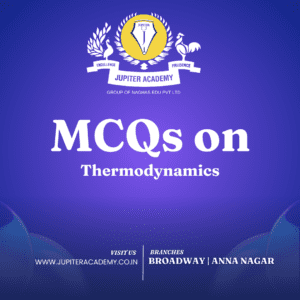NEET UG 2024 Re-Test result NTA Had Conducted the Re-test...
Read MoreThermodynamics MCQs for NEET - JEE
Thermodynamics is a branch of Physics that helps in understanding heat and temperature and their relation with work, energy, radiation, and other properties of matter.
Thank you for reading this post, don't forget to subscribe!
Certainly! Here are some multiple-choice questions (MCQs) on the topic of “Thermodynamics” for NEET and JEE (Joint Entrance Examination) preparation:
1. Which of the following laws of thermodynamics deals with the conservation of energy in a thermodynamic system?
a) Zeroth law
b) First law
c) Second law
d) Third law
2. The internal energy of an ideal gas depends on:
a) Only its temperature
b) Only its pressure
c) Both temperature and pressure
d) Neither temperature nor pressure
3. The efficiency of a Carnot engine operating between two heat reservoirs at temperatures T1 and T2 (T1 > T2) is given by:
a) (T2 / T1) × 100%
b) (T1 / T2) × 100%
c) (T1 – T2) / T1
d) 1 – (T2 / T1)
4. The molar specific heat of an ideal gas at constant volume (Cv) and at constant pressure (Cp) are related as:
a) Cv = Cp
b) Cp = Cv + R
c) Cp = Cv – R
d) Cp = 2Cv
5. A gas expands and performs 60 J of work on its surroundings. Simultaneously, it absorbs 100 J of heat from the surroundings. What is the change in internal energy of the gas?
a) 40 J (absorbed)
b) 40 J (released)
c) 160 J (absorbed)
d) 160 J (released)
6. Entropy is a measure of:
a) Total energy of the system
b) Disorder or randomness of a system
c) Temperature of the system
d) Heat content of the system
7. The process in which the volume and pressure of a gas remain constant is called:
a) Isothermal process
b) Isobaric process
c) Adiabatic process
d) Isochoric process
8. The specific heat capacity of water is higher compared to most substances. This is because:
a) Water has a higher mass.
b) Water molecules are closely packed.
c) Water has strong intermolecular forces.
d) Water has a high specific heat capacity naturally.
9. The efficiency of a heat engine is always less than 100% because:
a) Heat engines cannot convert all heat energy into work.
b) Heat engines have low-temperature reservoirs.
c) Heat engines involve irreversible processes.
d) Heat engines do not follow the laws of thermodynamics.
10. Which of the following statements about the second law of thermodynamics is true?
a) It states that energy cannot be created or destroyed.
b) It is also known as the law of conservation of energy.
c) It states that heat spontaneously flows from a colder body to a hotter body.
d) It imposes restrictions on the direction of processes and the efficiency of heat engines.
Answers:
1. b) First law
2. c) Both temperature and pressure
3. b) (T1 / T2) × 100%
4. b) Cp = Cv + R
5. b) 40 J (released)
6. b) Disorder or randomness of a system
7. d) Isochoric process
8. c) Water has strong intermolecular forces.
9. a) Heat engines cannot convert all heat energy into work.
10. d) It imposes restrictions on the direction of processes and the efficiency of heat engines.
Good luck with your exam preparation!
JEE Advanced 2024 registration window opens at jeeadv.ac.in. Here is how to apply
JEE Advanced 2024 registration window opens The Indian Institute of...
Read MoreLast chance for Photo correction in NEET 2024 Forms
Last Chance for Photo Correction in NEET 2024 Forms! Don’t...
Read MoreNEET UG 2024 exam city slips out now
Registered candidates can download their city slips from the official...
Read MoreThermodynamics MCQs for NEET – JEE Thermodynamics MCQs for NEET – JEE Thermodynamics MCQs for NEET – JEE Thermodynamics MCQs for NEET – JEE Thermodynamics MCQs for NEET – JEE Thermodynamics MCQs for NEET – JEE Thermodynamics MCQs for NEET – JEE Thermodynamics MCQs for NEET – JEE Thermodynamics MCQs for NEET – JEE Thermodynamics MCQs for NEET – JEE Thermodynamics MCQs for NEET – JEE Thermodynamics MCQs for NEET – JEE






